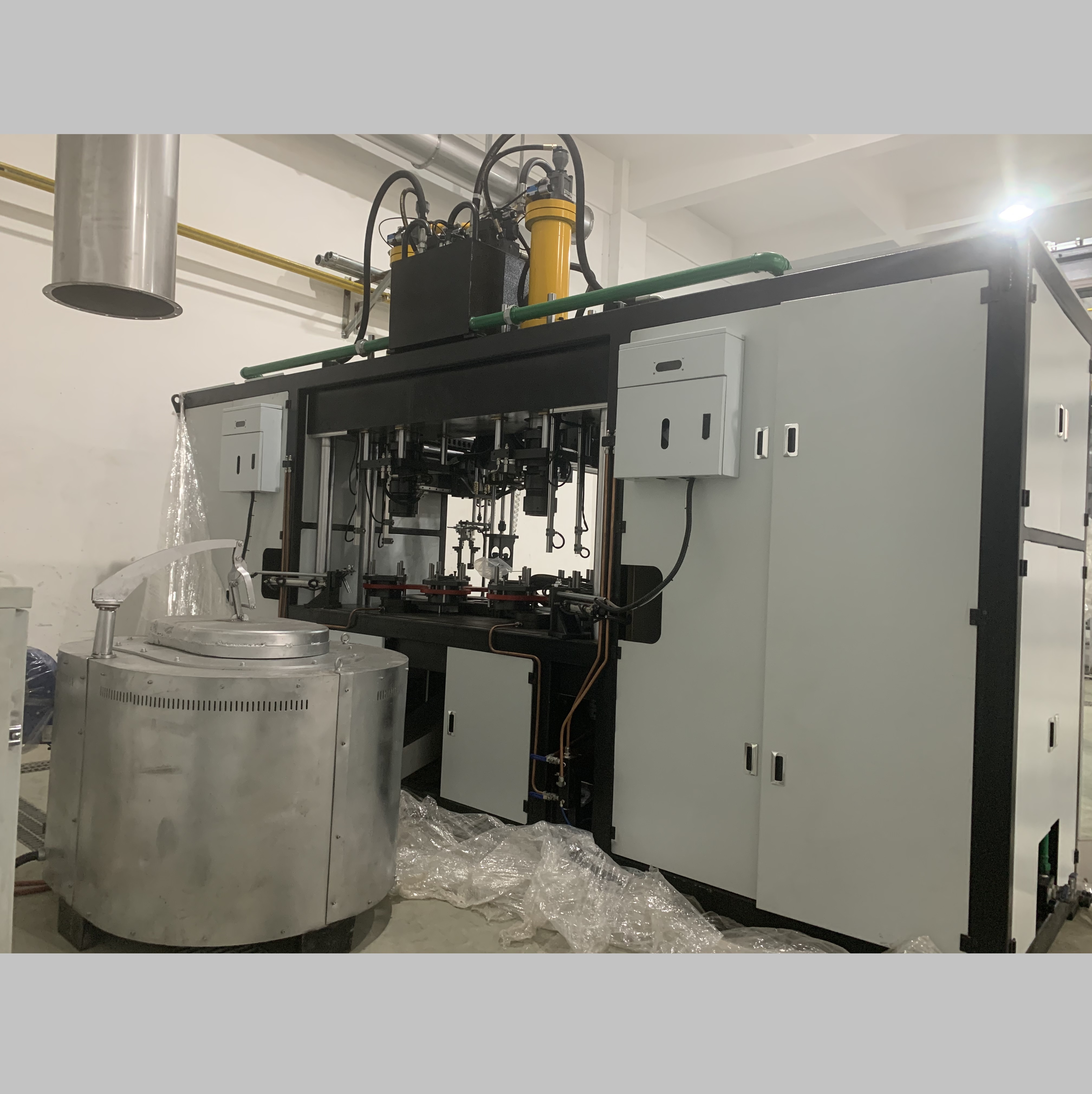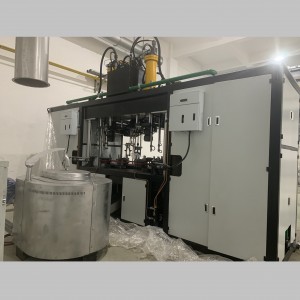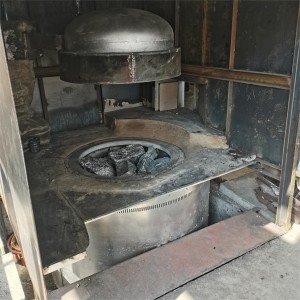Premium IGBT Induction Holding Furnace for Aluminium
Technical Parameter
Power Range: 0-500KW adjustable
Melting Speed: 2.5-3 hours/per furnace
Temperature Range: 0-1200℃
Cooling System: Air-cooled, zero water consumption
|
Aluminium Capacity |
Power |
|
130 KG |
30 KW |
|
200 KG |
40 KW |
|
300 KG |
60 KW |
|
400 KG |
80 KW |
|
500 KG |
100 KW |
|
600 KG |
120 KW |
|
800 KG |
160 KW |
|
1000 KG |
200 KW |
|
1500 KG |
300 KW |
|
2000 KG |
400 KW |
|
2500 KG |
450 KW |
|
3000 KG |
500 KW |
|
Copper Capacity |
Power |
|
150 KG |
30 KW |
|
200 KG |
40 KW |
|
300 KG |
60 KW |
|
350 KG |
80 KW |
|
500 KG |
100 KW |
|
800 KG |
160 KW |
|
1000 KG |
200 KW |
|
1200 KG |
220 KW |
|
1400 KG |
240 KW |
|
1600 KG |
260 KW |
|
1800 KG |
280 KW |
|
Zinc Capacity |
Power |
|
300 KG |
30 KW |
|
350 KG |
40 KW |
|
500 KG |
60 KW |
|
800 KG |
80 KW |
|
1000 KG |
100 KW |
|
1200 KG |
110 KW |
|
1400 KG |
120 KW |
|
1600 KG |
140 KW |
|
1800 KG |
160 KW |
Product Functions
Preset temperatures & timed start: Save costs with off-peak operation
Soft-start & frequency conversion: Automatic power adjustment
Overheat protection: Auto shutdown extends coil life by 30%
Advantages of High-Frequency Induction Furnaces
High-Frequency Eddy Current Heating
- High-frequency electromagnetic induction directly generates eddy currents in metals
- Energy conversion efficiency >98%, no resistive heat loss
Self-Heating Crucible Technology
- Electromagnetic field heats the crucible directly
- Crucible lifespan ↑30%, maintenance costs ↓50%
PLC Intelligent Temperature Control
- PID algorithm + multi-layer protection
- Prevents metal overheating
Smart Power Management
- Soft-start protects power grid
- Auto frequency conversion saves 15-20% energy
- Solar-compatible
Applications
Die Casting Factory
Die Casting of
Zinc/Aluminum/Brass
- In die casting, where molten aluminium is injected into molds under pressure, holding furnaces help maintain the temperature of the metal. This is crucial for ensuring that the aluminium is at the correct viscosity for high-quality casting, reducing the chance of defects and improving the efficiency of the process.
Casting and Foundry Factory
Casting of Zinc/Aluminum/Brass/Copper
- Holding furnaces are essential for maintaining molten aluminium at the correct temperature in casting operations. This ensures that the metal does not cool and solidify before it is poured into molds. By using a holding furnace, aluminium foundries can keep their metal at optimal temperatures, allowing for consistent and high-quality casting results.
Scrap Metal Recycling Factory
Recycle of Zinc/Aluminum/Brass/Copper
- In recycling processes, holding furnaces are used to store and maintain molten aluminium until it is ready to be used in manufacturing new products. With precise temperature control, the furnace ensures that recycled aluminium retains its fluidity, making it easy to pour into molds and produce high-quality recycled aluminium products.
Customer Pain Points
Resistance Furnace vs. Our High-Frequency Induction Furnace
| Features | Traditional Problems | Our Solution |
| Crucible Efficiency | Carbon buildup slows melting | Self-heating crucible maintains efficiency |
| Heating Element | Replace every 3-6 months | Copper coil lasts years |
| Energy Costs | 15-20% annual increase | 20% more efficient than resistance furnaces |
.
.
Medium-Frequency Furnace vs. Our High-Frequency Induction Furnace
| Feature | Medium-Frequency Furnace | Our Solutions |
| Cooling System | Relies on complex water cooling, high maintenance | Air cooling system, low maintenance |
| Temperature Control | Rapid heating causes overburning of low-melt metals (e.g., Al, Cu), severe oxidation | Auto-adjusts power near target temp to prevent overburning |
| Energy Efficiency | High energy consumption, electricity costs dominate | Saves 30% electric energy |
| Ease of Operation | Requires skilled workers for manual control | Fully automated PLC, one-touch operation, no skill dependency |
Installation Guide
20-minute quick installation with complete support for seamless production setup
Why Choose Us
Unmatched Energy Efficiency
Have you ever wondered why induction melting furnaces are so energy-efficient? By inducing heat directly into the material rather than heating the furnace itself, induction furnaces minimize energy loss. This technology ensures that every unit of electricity is utilized efficiently, translating into significant cost savings. Expect up to 30% lower energy consumption compared to conventional resistance furnaces!
Superior Metal Quality
Induction furnaces produce a more uniform and controlled temperature, leading to a higher quality of the molten metal. Whether you're melting copper, aluminum, or precious metals, the induction melting furnace ensures that your final product will be free of impurities and have a more consistent chemical composition. Want high-quality casts? This furnace has got you covered.
Faster Melting Time
Do you need faster melting times to keep your production on track? Induction furnaces heat metals quickly and evenly, allowing you to melt large quantities in less time. This means faster turnaround times for your casting operations, increasing overall productivity and profitability.
Advantages of Holding Furnace for Aluminium
- Precise Temperature Control
- One of the most important features of a Holding Furnace for Aluminium is its precise temperature control. It helps keep the molten aluminium at the right temperature for a prolonged period, which is critical for quality control in casting operations. This means there’s no risk of solidification or overheating, ensuring the consistency of the molten metal throughout the process.
- The furnace uses advanced temperature regulation systems to maintain a stable thermal environment. By using automatic temperature controllers, the system adjusts the heat input to keep the temperature within a specific range. This ensures that the aluminium remains in a fluid state, ready for pouring into molds.
- Crucible Direct Heating
- Direct heating of the crucible is another standout feature. In a holding furnace, the heating elements are designed to directly heat the crucible containing the molten aluminium. This approach provides several advantages:
- Faster heating time: Direct contact with the crucible reduces heat loss and speeds up the melting process.
- Consistent temperature: Since the heating elements are in direct contact with the crucible, it ensures even heating, which is essential for preventing temperature fluctuations that could affect metal quality.
- Energy efficiency: With direct heating, the furnace can maintain a constant temperature with less energy compared to indirect heating systems.
- Direct heating of the crucible is another standout feature. In a holding furnace, the heating elements are designed to directly heat the crucible containing the molten aluminium. This approach provides several advantages:
- Air Cooling System
- Air cooling systems are used in holding furnaces instead of traditional water-cooling systems. This provides several benefits:
- Reduced maintenance: Air cooling eliminates the need for water connections and drainage systems, reducing maintenance requirements and costs.
- Less risk of contamination: Water cooling systems can sometimes lead to rust or contamination of the metal, but with air cooling, this risk is minimized.
- Environmentally friendly: Air cooling is a more sustainable solution as it doesn’t require water treatment or additional infrastructure.
With air cooling, the holding furnace operates efficiently while minimizing the need for external resources.
- Air cooling systems are used in holding furnaces instead of traditional water-cooling systems. This provides several benefits:
Frequently Asked Questions
Q1: How much energy can I save with an induction melting furnace?
Induction furnaces can reduce energy consumption by up to 30%, making them the go-to choice for cost-conscious manufacturers.
Q2: Is an induction melting furnace easy to maintain?
Yes! Induction furnaces require significantly less maintenance compared to traditional furnaces, saving you time and money.
Q3: What types of metals can be melted using an induction furnace?
Induction melting furnaces are versatile and can be used for melting ferrous and non-ferrous metals, including aluminum, copper, gold.
Q4: Can I customize my induction furnace?
Absolutely! We offer OEM services to tailor the furnace to your specific needs, including size, power capacity, and branding.
1. What is the main advantage of a Holding Furnace for Aluminium?
The main advantage of a Holding Furnace for Aluminium is its ability to maintain molten metal at a steady temperature, ensuring high-quality casting with minimal temperature fluctuations. This allows for better control over the casting process and results in fewer defects.
2. How does the air cooling system in the Holding Furnace work?
The air cooling system circulates air around the furnace components to keep them cool. It eliminates the need for water cooling, which reduces the risk of water-related issues and requires less maintenance.
3. Can the Holding Furnace be used for other metals besides aluminium?
While holding furnaces are primarily used for aluminium, they can be adapted to work with other non-ferrous metals, depending on the required temperature range and the specific properties of the metal.
4. How long can the Holding Furnace maintain molten aluminium at a stable temperature?
A Holding Furnace for Aluminium can maintain molten metal at a stable temperature for extended periods, ranging from a few hours to a day, depending on the furnace size and insulation quality. This makes it suitable for both small and large-scale operations.

Our Team
No matter where your company is located, we are able to offer a professional team service within 48 hours. Our teams are always in high alert so your potential problems can be solved with military precision. Our employees are constantly educated so they are up to date with current market trends.













